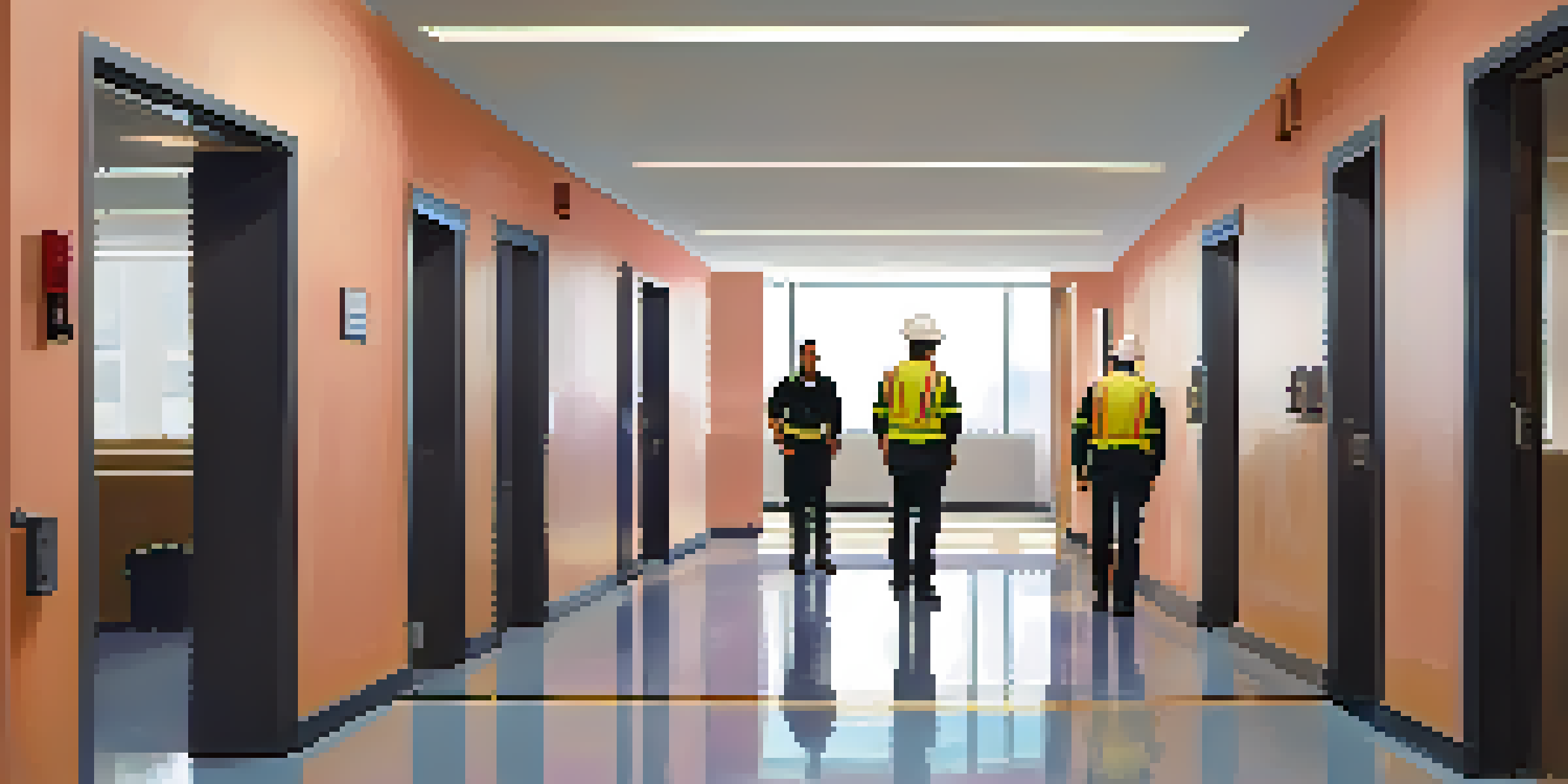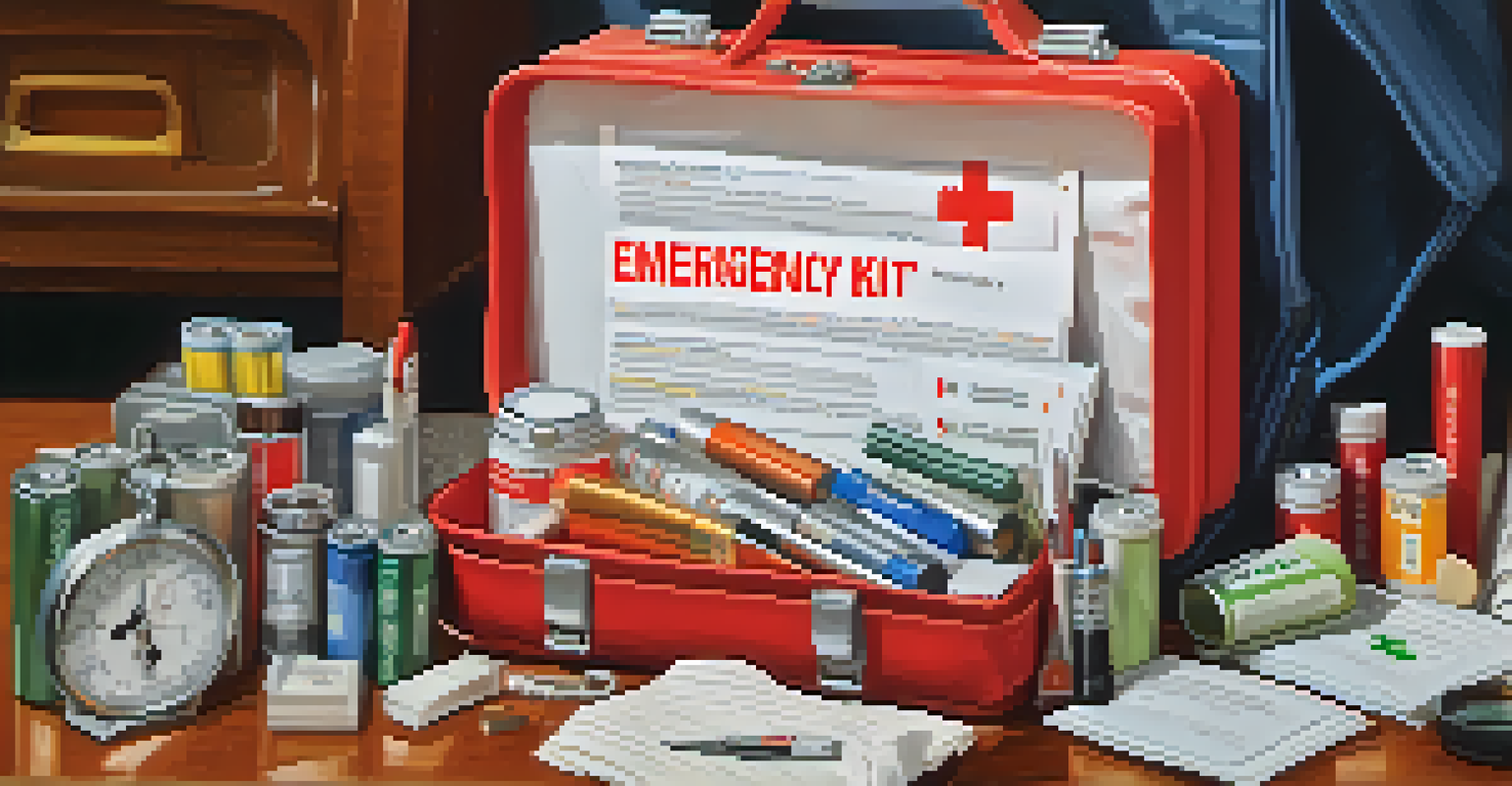Emergency Preparedness in Property Management Practices

Understanding Emergency Preparedness in Property Management
Emergency preparedness is crucial in property management, ensuring safety and minimizing damage during crises. It's about having the right plans and resources in place to respond effectively to unforeseen events. This can range from natural disasters to fires or even health emergencies, affecting not just property but also the well-being of tenants and staff.
By failing to prepare, you are preparing to fail.
For property managers, understanding the risks associated with their specific locations is the first step. For instance, a building in a hurricane-prone area needs different preparations than one situated in a region with heavy snowfall. By identifying these unique risks, property managers can tailor their emergency plans to address specific challenges effectively.
Ultimately, effective emergency preparedness not only protects assets but also builds trust with tenants. When residents see that their property management team is proactive about safety, it fosters a sense of community and confidence in their living environment.
Creating Comprehensive Emergency Plans for Properties
A robust emergency plan is the backbone of any property management strategy. This plan should cover a variety of potential emergencies, outlining clear steps for evacuation, communication, and recovery. It's essential that these plans are documented and easily accessible to all staff and residents, ensuring everyone knows what to do when crises arise.

Engaging with local emergency services can enhance your plan significantly. By collaborating with fire departments, police, and medical services, property managers can receive valuable insights into best practices and resources available during emergencies. This partnership can also streamline response times and improve safety outcomes.
Importance of Emergency Plans
Having a comprehensive emergency plan is essential for ensuring safety and effective response during crises.
Regular drills and training sessions are vital to ensure that everyone is familiar with the emergency plan. Practicing these scenarios not only helps staff feel more confident but also prepares tenants for real-life situations, ultimately saving lives and reducing panic during actual emergencies.
Establishing Clear Communication Channels for Emergencies
Effective communication is key during emergencies. Property managers must establish clear channels to relay important information to tenants swiftly. This can include text alerts, emails, or even social media updates, ensuring that everyone stays informed regardless of the situation.
An ounce of prevention is worth a pound of cure.
It's also important to have a designated spokesperson or point of contact during emergencies. This person should be responsible for communicating updates and coordinating efforts, reducing confusion and ensuring that all messages are consistent and accurate. A clear line of communication can help manage panic and provide reassurance to residents.
Regularly updating contact information for tenants is crucial for maintaining these communication channels. Encouraging residents to provide multiple methods of contact will ensure that property managers can reach them in various situations, increasing the likelihood that essential information gets to everyone when it matters most.
Training Staff for Effective Emergency Response
Training your staff is one of the most critical aspects of emergency preparedness. Property management teams should undergo regular training sessions that cover emergency protocols, first aid, and crisis management. This ensures that everyone knows their role and can act quickly and decisively when an emergency occurs.
Consider partnering with local training organizations or emergency services to provide specialized training. This not only brings professional insights into your team but also builds relationships with local responders, which can be invaluable during actual emergencies. Engaging staff in realistic scenarios can improve their confidence and effectiveness.
Training and Engaging Staff
Regular training for staff and engaging tenants in emergency preparedness fosters a culture of safety and readiness.
Moreover, ongoing training should be part of your culture. Keeping emergency procedures fresh in everyone's mind encourages a proactive approach to safety, ensuring that staff are not only prepared but also feel empowered to act. Regular reviews of emergency plans and procedures will help everyone stay sharp.
Conducting Regular Safety Inspections and Maintenance
Regular safety inspections are essential for identifying potential hazards within properties. Property managers should implement a routine schedule to inspect electrical systems, fire alarms, and emergency exits, ensuring everything is functioning correctly. Early detection of issues can prevent emergencies or minimize their impact.
Maintenance staff should be well-trained to recognize safety concerns and report them promptly. Establishing a culture of safety within your team encourages everyone to take responsibility for the property's condition. Regularly reviewing maintenance logs can also help identify patterns or recurring issues that need addressing.
In addition to inspections, proactive maintenance of emergency equipment like fire extinguishers and first aid kits is crucial. Ensuring these are up to date and in working order can make a significant difference in emergency situations, potentially saving lives and reducing injury.
Developing Relationships with Local Emergency Services
Building strong relationships with local emergency services can greatly enhance your property's preparedness. Regular meetings and communication with local police, fire departments, and hospitals can provide valuable insights into community resources available during emergencies. These relationships can also facilitate faster responses in times of crisis.
Consider inviting local emergency personnel to your property for tours. This not only familiarizes them with the layout and unique features of your property but also builds rapport. Such interactions can help responders understand the specific needs of your tenants and property during emergencies.
Collaboration with Local Services
Building relationships with local emergency services enhances property preparedness and response times during emergencies.
Furthermore, participating in community emergency preparedness initiatives can strengthen these relationships. Engaging in local drills or safety workshops fosters collaboration and creates a network of support that can be invaluable during actual emergencies.
Engaging Tenants in Emergency Preparedness Efforts
Engaging tenants in emergency preparedness is essential for creating a culture of safety within your property. Organizing workshops or information sessions can empower residents with knowledge about safety protocols and emergency plans. When tenants understand what to do in a crisis, they are more likely to remain calm and follow procedures.
Creating a tenant emergency response group can be an effective way to involve residents actively. This group can help disseminate information, assist with drills, and even participate in safety inspections. Involvement fosters a sense of community and responsibility among residents, making them more likely to take emergency preparedness seriously.

Additionally, providing tenants with access to emergency resources, like contact lists or safety kits, can further enhance their preparedness. When residents have the tools and information they need, it creates a more secure living environment for everyone.